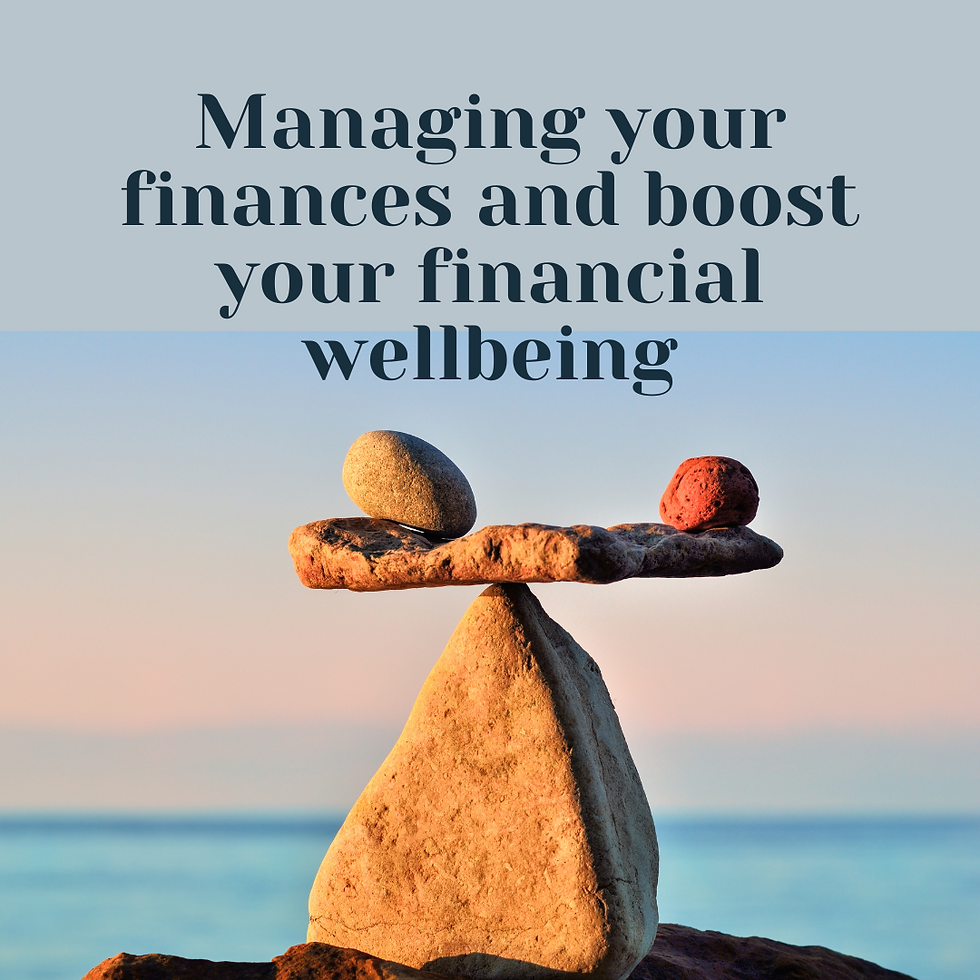3 useful ways to manage your finances and boost your financial wellbeing
- siobhan438
- Dec 4, 2023
- 3 min read

The cost of living crisis has dominated the headlines since inflation began to creep up from historic lows in mid-2021. While the Covid pandemic began the inflationary increase, the situation was made worse by the war in Ukraine, which pushed up energy and food prices even further. Following such an extended period of price rises, you may be concerned about your household finances and long-term plans. If you want to understand how you can tweak your expenses and finances to best protect your wealth through the cost of living crisis, read on for three practical tips.
01 Keep calm and carry on protecting yourself
It can be easier said than done, but even when your bills are rising and things are looking a bit worrying, staying calm and thinking objectively about your finances really is the best way to approach the challenge.
You might be tempted to start cutting down on your expenses, but one thing it’s really important not to cut is your financial protection. Research has revealed that 1 in 7 people in the UK are considering cancelling their life insurance policies to save money during the cost of living crisis.
Removing a monthly expense such as a life insurance or income protection premium might feel like a smart move in the short term.
But things could become even more challenging if you were to fall ill and not be able to work for a few months or longer. If this were to happen when you’d cancelled your cover, you might struggle even more without the potential pay out from your policy. If you are struggling to pay your monthly expenses, it’s important to reach out and talk to an expert. We can help you to see your finances more clearly and to create a plan of action that takes you from worrying about money to feeling in control.
02 Reducing debt might be the best place to start
If you want to boost your financial wellbeing, it might be best to begin by reducing your debts to lenders. If you have high levels of debt, your monthly payments could be one of your most costly expenses. If you have some savings, reducing or eliminating the amount you owe could help free up money to be deployed more usefully elsewhere. High-interest debt is often tied to credit card debt. If you’re carrying a long-standing balance from month to month it could be costing you dearly every month.
To illustrate the potentially damaging effects of interest on debt, if you have £1,000 sitting in a savings account earning 1% interest, you’re only making £10 a year. If you have £1,000 on a credit card at 18% interest, you’ll be paying £180 a year. Using your savings to pay off the debt will mean you are £170 a year better off. In short, the sooner you can cancel out debt the better. If you have debt in multiple places, you might want to consider consolidating them. There are various options for consolidating debt, but the right solution will depend on your individual circumstances. We can help you understand which course of action might be most suitable for you.
03 There might be some easy cost savings that will reduce your monthly bills
Once these bigger things are taken care of, you can look for some smaller actions you could take to reduce your monthly expenses.
Review your bank statement to identify anything that you no longer need.
Things to look out for include:
• Streaming services that you rarely or never use • Subscriptions that you don’t get value from • Gym memberships that you don’t use • Delivery fees for online shopping
Given the sharp rise in energy costs, it may also be helpful to consider how you could use energy more efficiently in your home to save costs. The Energy Saving Trust reports that the average UK household spends £65 a year powering appliances on standby mode. So, remaining vigilant about turning off appliances like TVs or games consoles when you aren’t using them could help to save money across the year.
Additional savings could be made by installing and fully utilising the features of a smart thermostat; the average instalment cost is £225. The Energy Saving Trust estimates that a typical household could save £180 a year by using a smart thermostat so that your heating only comes on when you need it. By identifying and plugging these ‘money leaks’, you may be able to reduce your monthly expenses without having to slash spending on the things you enjoy
Get in touch
If you’re worried about the rising cost of living and would like to discuss ways to protect your finances from the effects of inflation and rising energy prices, we’re here to help. Please get in touch to arrange a time to chat.
Think carefully before securing other debts against your home. Your home may be repossessed if you do not keep up repayments on your mortgage.
Approved by The Openwork Partnership on 04.10.2023





Comments